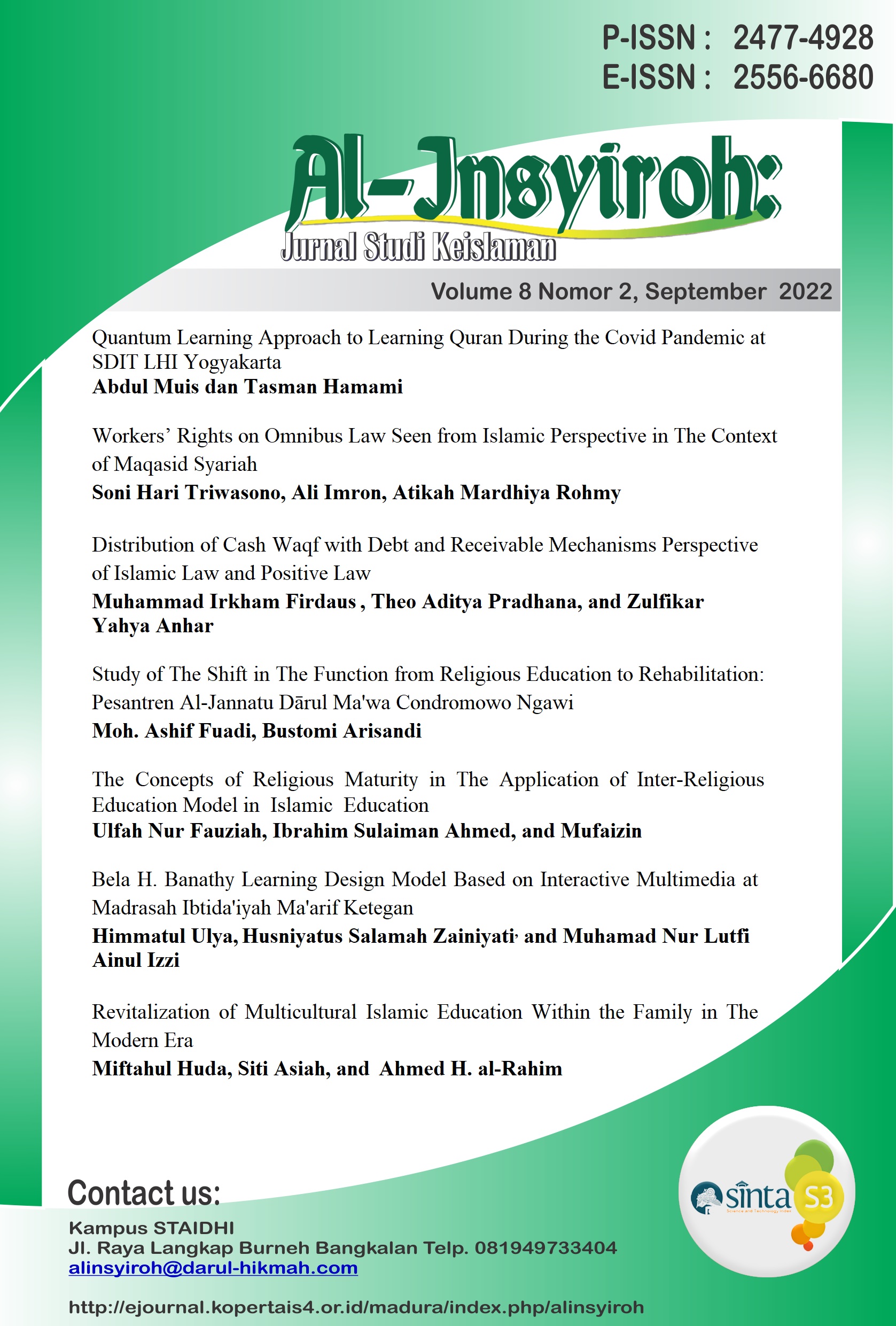Study of The Shift in The Function from Religious Education to Rehabilitation: Pesantren Al-Jannatu DÄrul Ma'wa Condromowo Ngawi
DOI:
https://doi.org/10.35309/alinsyiroh.v8i2.5869Keywords:
Pesantren Condromowo, Shifting Function, Religuous, RehabilitationAbstract
Pesantren also accompanied the beginning of the journey and development of Islam. As an educational institution that breathes Islam, Pesantren can grow and develop. In this study, the author chose Pesantren al-Jannatu DÄrul Ma’wa Condromowo as the subject of the study. Pesantren Condromowois a Salaf Pesantren that focuses its attention on people who have mental illness in addition to continuing to teach religious sciences. This study aims to see the process of shifting the function of pesantren, what context is behind the change in function, and how the implications of changing the function of pesantren. This research uses historical research methods with stages of topic selection, heuristics, verification, interpretation, and historiography. The historical analysis is supported by literature studies, interviews, and observations. This result shows that several things background the development and changes of Pesantren. In the external context of the changes that occur in the case of increasing the percentage of mentally ill students every year, the impact of modernization, and the view that pesantren is a place of treatment for alternative In the internal context, change occurs due to the science and attitude of the Kiai in responding to the changes that occur. The implication is that there is a new typology in the world of pesantren, namely Pesantren Rehabilitation.References
Adi, I. R. (2013). Kesejahteraan Sosial: Pekerja Sosial, Pembangunan sosial dan Kajian Pembangunan. Jakarta: Raja Grafindo Persada.
Alawiyah, Desi, and Iin Handayani. “Penanaman Nilai Spiritual Dalam Dimensi Psikoterapi Islam Di PP. Rehabilitasi Salafiyah Syafi’iyah Nashrun Minallah.†KONSELI: Jurnal Bimbingan Dan Konseling (E-Journal) 6, no. 1 (2019): 23–32.
Ariyanti, Vivi, and Bani Syarif Maula. “Rehabilitasi Berbasis Pesantren Bagi Penyalah Guna Narkotika Sebagai Bentuk Perlindungan Hukum.†KOMUNIKA: Jurnal Dakwah Dan Komunikasi 14, no. 2 (2020): 259–82. https://doi.org/10.24090/komunika.v14i2.3757.
Azra, A. (2019). Pendidikan Islam: tradisi dan modernisasi di tengah tantangan milenium III. Jakarta: Prenada Media.
Badri, & Munawiroh. (2007). Pergeseran Literatur Pesantren Salafiah. Jakarta: Puslitbang Lektur Keagamaan.
Balitbang Departemen Sosial RI. (2003). Pola Pembangunan Kesejahteraan Sosial. Jakarta: Balitbang Departemen Sosial RI.
Dhofir, Z. (2015). Tradisi Pesantren: Studi Pandangan Hidup Kyai dan Visinya Mengenai Masa Depan Indonesia. Jakarta: LP3ES.
Drajat, Z. (1985). Kesehatan Mental. Jakarta: Gunung Agung.
Fathullah, A. (1998). Solusi Islam Atas Problematika Umat: Ekonomi, Pendidikan dan Dakwah. Jakarta: Gema Insani Press.
Fatmawati, R. D., & Affandi, M. A. (2018). Konstruksi Wali santri Terhadap Proses Rehabilitasi Mental di Pondok Pesantren Salafiyah al Jannatu Daarul Ma’wa. Jurnal Paradigma, 6(1).
Fuadi, M. A., & Khakim, Y. S. (2022). Dinamika Pemberdayaan Masyarakat di Pesantren LDII Millenium Alfiena Nganjuk. Asketik: Jurnal Agama dan Perubahan Sosial, 6(1), 29–46.
Hawari, D. (1996). Al-Qur’an: Ilmu Kedokteran Jiwa dan Kesehatan Jiwa. Jakarta: ana Bhakti Prima Yasa.
Hawi, Akmal. “Remaja Pecandu Narkoba: Studi Tentang Rehabilitasi Integratif Di Panti Rehabilitasi Narkoba Pondok Pesantren Ar-Rahman Palembang.†Tadrib: Jurnal Pendidikan Agama Islam 4, no. 1 (2018): 99–119. https://doi.org/10.19109/tadrib.v4i1.1958.
Kuntowijoyo. (2013). Pengantar ilmu sejarah. Yogyakarta: Tiara Wacana.
Lestari, P. (2012). Metode Terapi dan Rehabilitasi Korban Napza di Pondok Pesantren Suryalaya Tasikmalaya. DIMENSIA: Jurnal Kajian Sosiologi, 6(1), 1–16.
Machsun, Toha. “Model Pendidikan Agama Islam Dalam Rehabilitasi Tetirah Dzikir Sleman Yogyakarta.†El-Banat 10, no. 66 (2020): 110–12. https://doi.org/https://doi.org/10.54180/elbanat.2020.10.1.109-127.
Mastuhu. (1994). Dinamika Pendidikan Pondok Pesantren. Jakarta: INIS.
Mufaizin, M. Nasionalisme dalam Perspektif Alquran dan Hadits. Al-Insyiroh, 5(1), 40-56.
Najati, U. (2008). The Ultimate Psychologi Sempurna ala Nabi Muhammad Saw. (Hedi, Ed.). Bandung: Pustaka Hidayah.
Nizar, S. (2013). Sejarah Sosial & Dinamika Intelektual Pendidikan Islam di Nusantara. Jakarta: Kencana Prenada Media Grup.
Perdana, A. (2005). Terapi Ruqyah Sebagai Sarana Mengobati Orang Yang Tidak Sehat Mental. Jurnal Psikologi Islami, 1(1), 87–96.
Ramdhan, T. W. (2018). Islam Nusantara: Pribumisasi Islam ala NU. Al-Insyiroh: Jurnal Studi Keislaman, 2(1), 73-91.
Royani, A. (2020). Pesantren Dalam Bingkai Sejarah Perjuangan Kemerdekaan Indonesia. Jurnal Islam Nusantara, 2(1), 121–128.
Suhaimi. (2015). Gangguan Jiwa Dalam Perspektif. Risalah, 26(4), 197–205.
Susanto, D. (2014). Dakwah melalui layanan psikoterapi ruqyah bagi pasien penderita kesurupan. Konseling Religi: Jurnal Bimbingan Konseling Islam, 5(2), 313–334.
Attachment Pondok Pesantren al-Jannatu Daarul Ma’wa Condromowo tahun 2016.
Interview K.H. Abdul Hamid the Educator of Pesantren Condromowo 2021.
Interview Mujiburrahman. Head (Lurah) of Pesantren Pesantren al-Jannatu Daarul Ma’wa 2022
Interview management of Pesantren Condromowo 13 Februari 2022.
Interview Santri (anonim). Santri (student) of Pesantren Condromowo 2022.
Downloads
Published
How to Cite
Issue
Section
License
Copyright (c) 2022 Al-Insyiroh: Jurnal Studi Keislaman

This work is licensed under a Creative Commons Attribution-ShareAlike 4.0 International License.

This work is licensed under a Creative Commons Attribution-ShareAlike 4.0 International License.









